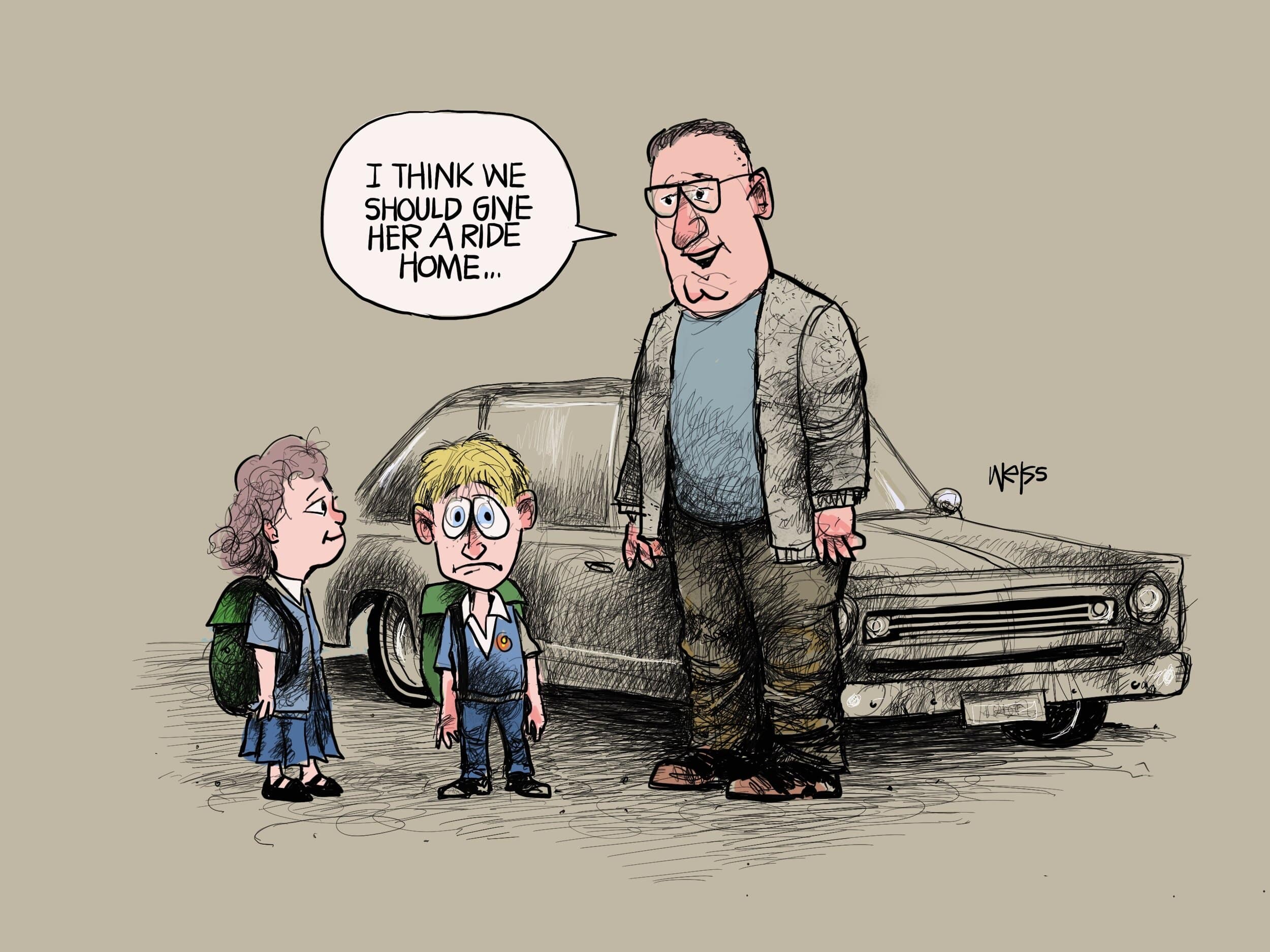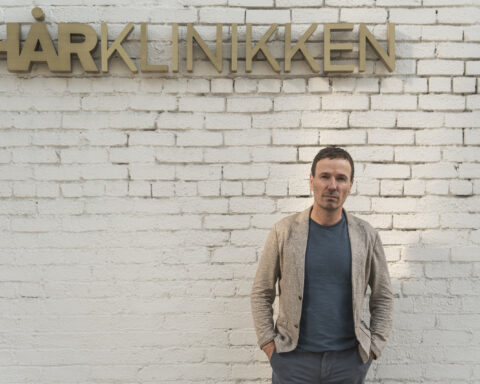At Mr Feelgood we want to introduce you to some of the most inspirational people we have found along the way.
John P Weiss may not be top of the Amazon bestsellers list or a regular guest on the self-help segments of daytime TV shows, but his blog where he shares his life lessons and cartoons has 40,000 loyal subscribers — including us — who benefit from his wisdom and enjoy his deft way with words.
John is a former police chief for the Scotts Valley Police Department in Northern California. He served a distinguished 26-year career in law enforcement, the last ten a Chief of Police. He chaired the county police chief’s association and county animal shelter and is the recipient of the ‘Medal of Merit’ for his work with children in his community. During his time in the force he moonlighted as an editorial cartoonist for several newspapers, before retiring early in order to pursue his writing, cartooning, and artwork full-time.
Here he shares one of his own most important life lessons — a tale of kindness, grace and authenticity that helped teach him what life should be about.

Illustrations : John P Weiss
“What if you were her, Johnny? Wouldn’t you want someone to help you? To take you home?” Dad smiled at me, but I still felt resistant. The emotions of youth can blur your conscience.
The little girl’s name was Melinda and car trouble prevented her mother from picking her up after school. As other parents arrived, the principal asked if someone could help. My father, ever the kind soul, volunteered.
The principal provided Dad with Melinda’s home address, which wasn’t far from our home. Dad introduced himself to Melinda and said we would give her a ride home.
As some of my friends snickered and laughed in the distance, Dad opened the door to our car and Melinda slid into the front passenger seat with a smile.
I crawled into the backseat and shot an angry stare at my friends. As we drove away, I imagined the teasing I’d receive the next day at school.
Melinda was a pleasant, intellectually disabled girl who showed up at the private school I attended one chilly fall day.
When she first strolled into our fifth-grade class, we knew she was different. She had a light complexion, mouse-brown hair, kind eyes, and a slight lisp when she spoke. It took her a moment to form thoughts and words.

She seemed awkward in her school uniform and cardigan sweater. And since children are cruel, it didn’t take long before little spit wads were flung her way in class. Other times, snickers and mean jokes were directed at her.
“Children are very cruel, yes. Of course. Children are extraordinarily cruel little creatures.” — Dennis Potter
Young, immature and wanting to fit in, I joked about Melinda just like my friends did. Funny that I had forgotten what it was like to be the new kid at school. The feelings of trepidation and aloneness.
It wasn’t long ago that I bounced around from public to private school. How quickly I forgot my own awkwardness in wearing the private school uniform. Not to mention the fear of not making any friends or fitting in. I failed to imagine how an intellectual disability would only amplify all those feelings.
We drove Melinda home and Dad engaged her in polite conversation. In her own staccato way, she chatted freely about her favorite things, TV shows, and pets. She liked some of the same television shows I did.
When we arrived at her house, Dad looked at me in the backseat. “Johnny, be a gentleman and walk Melinda to her front door, please.”
I was mortified. It was bad enough that I had to be seen taking her home, but now I had to walk to her house with her!
Begrudgingly, I got out of the car, opened the door for Melinda, and walked to her front door. Halfway up the walkway, she turned to me with a sweet smile, looked into my eyes and said, “Thank you, J-J-Johnny, for being so nice to me.”

I don’t think I’ll ever forget that moment. How it stripped away my selfish pride and made me see her sweetness. Her humanity. Maybe even her pain and vulnerability.
When I got back into the car, Dad patted me on the leg and said, “I know you didn’t want to take her home, Johnny, but it was the right thing to do. Thank you for walking her to the door.”
“It’s okay,” I told my Dad, “I guess she’s alright.”
The next day at school my friends didn’t waste much time. “How’s your girlfriend, John?” one of the boys asked with a grin.
“She’s not my girlfriend,” I said, “We just helped her out.”
The teasing continued for a few days but eventually leveled off. As for me, something had changed inside. Suddenly, some of my friends didn’t seem all that cool anymore. In a way, they were kind of ugly. Always making fun of the weaker or awkward kids.
Over time, I started to distance myself from some of those friends. Melinda, perhaps sensing the shift in me, began talking to me more. I found her to be consistently pleasant with never a negative thing to say about anyone.
It made me wonder about who really possessed the intellectual disability.
Fast forward many years. I’m a young man in a theater watching a Tom Hanks movie. It’s about an intellectually disabled man. It chronicles the bullying he received in his boyhood, his deep love of a girl, and his remarkable path to manhood.
Forrest Gump was a movie about love, but it offered so many more life lessons. If fact, I think this is what life should be about:

THE LESSONS IN FORREST GUMP
Here are the top three lessons that I took away from the movie.
Authenticity
Forrest Gump was unapologetically who he was. No pretension. No posturing. No ego. He loved to mow his own grass. Even when he became successful, he still mowed his own lawn.
How many of us do the things we do for the approval or attention of others? Are we living in the gym to build an amazing body for ourselves or for the admiration of others? Do we get someone else to mow the lawn because it’s beneath us?
Do we buy expensive cars for ourselves or our image? There’s nothing wrong with fitness and success, but it should reflect our authentic selves, not a need to impress others.
Nonjudgmental
Maybe those who have suffered the cruelties of others better understand the gifts of kindness and being nonjudgmental.
Forrest Gump was pure and nonjudgmental. Even when his childhood love, Jenny, came back home to see him, there was no judgment. Just Forrest’s acceptance, gratitude, and love.
Forrest Gump managed to see the good in everyone that few of us would find. He may have had a disability, but he understood what love was.
If only the rest of us could see the world the way Forrest Gump does.
Honesty
Forrest Gump was always honest, whether people liked it or not. What you saw is what you got. No deception. No doublespeak. What a rare thing in this day and age.
Yes, we all tell little white lies from time to time. Usually, benevolent lies to avoid hurt feelings in others. “No honey, your bottom doesn’t look too big in that spandex outfit.”
Imagine though, if we could be more honest. If we could find a way, to tell the truth gently. Perhaps, in the long run, we’d avoid more misunderstandings and hurt feelings. Maybe we’d get closer to the things that really matter?

Funny, after all these years, I’m still thinking about Melinda and those early school days. I barely remember the names of the boys I hung out with back then, but I still remember Melinda.
Grace in others has a way of doing that. It stays with you through the years. My father’s kindness was another kind of grace. So was the gentleness of my grandmother, Mary Murray.
I’ve tried to shape my own behavior and life after people like my father, grandmother and even Melinda. Sometimes I have fallen short, as we all do, but their memory serves as a reliable guidepost.
One of my favorite poems is the Desiderata (Latin: “Things Desired”) by Max Ehrmann.
The poem reminds us to strive for high ideals. To treat others kindly, accept others for who they are, and be gentle with ourselves. Pretty much everything Forrest Gump did.
Beyond the lessons of Forrest Gump, the Desiderata captures what life should be about. It’s worth reading:
Go placidly amid the noise and the haste, and remember what peace there may be in silence. As far as possible, without surrender, be on good terms with all persons.
Speak your truth quietly and clearly; and listen to others, even to the dull and the ignorant; they too have their story.
Avoid loud and aggressive persons; they are vexatious to the spirit. If you compare yourself with others, you may become vain or bitter, for always there will be greater and lesser persons than yourself.
Enjoy your achievements as well as your plans. Keep interested in your own career, however humble; it is a real possession in the changing fortunes of time.
Exercise caution in your business affairs, for the world is full of trickery. But let this not blind you to what virtue there is; many persons strive for high ideals, and everywhere life is full of heroism.
Be yourself. Especially do not feign affection. Neither be cynical about love; for in the face of all aridity and disenchantment, it is as perennial as the grass.
Take kindly the counsel of the years, gracefully surrendering the things of youth.
Nurture strength of spirit to shield you in sudden misfortune. But do not distress yourself with dark imaginings. Many fears are born of fatigue and loneliness.
Beyond a wholesome discipline, be gentle with yourself. You are a child of the universe no less than the trees and the stars; you have a right to be here.
And whether or not it is clear to you, no doubt the universe is unfolding as it should. Therefore be at peace with God, whatever you conceive Him to be. And whatever your labors and aspirations, in the noisy confusion of life, keep peace in your soul. With all its sham, drudgery and broken dreams, it is still a beautiful world. Be cheerful. Strive to be happy.
What about you? Who have you shaped your life after? Who has inspired you to be a better person? It’s never too late to craft a better you.
Perhaps the lessons of Forrest Gump, or the wisdom of the Desiderata, will help you discover what life is about.
Because, as the poem so eloquently states: “With all its sham, drudgery and broken dreams, it is still a beautiful world.”
May you experience such beauty in your life.
Read more from John P Weiss at johnpweiss.com











